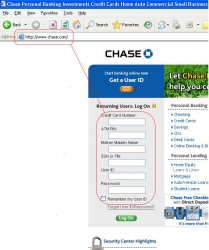The only thing I hate about Apple is it's uppity ignorant/arrogant user base. It's not just about Paypal (most of the top 10 US banks have been hacked, etc, at least once), or email, or easily spotted cloned websites.
You'd surprised to learn how technologically advanced phishing methods have become.
Some of you guys are uber Apple homers. So much so that you'll actually brush off a legitimate and serious growing threat (that no one on the internet backbone is immune to), then pass the blame to protect Apple? No one organization has the resources or manpower to protect the end-user from these threats. It is everyone's responsibility and the fact that Apple doesn't beef up it's security measures to help protect it's customers, is just plain careless. I wonder where so many Apple users get their arrogance/ignorance from?
IE sucks, but it incorporates an appropriate (and pretty impressive, if I might add) security layer. And, like it or not, Paypal is used by millions across the globe. Somewhere down the line you'll use it, or something similar to it.
If you're a true Apple loyalist, you better hope Macs never take the market share from Microsoft; because if it ever does, we'll all be caught with our pants around our ankles when the hackers and script kiddies start to target us.
Apple isn't bullet-proof... no matter what Steve Jobs and Justin Long tell you.


